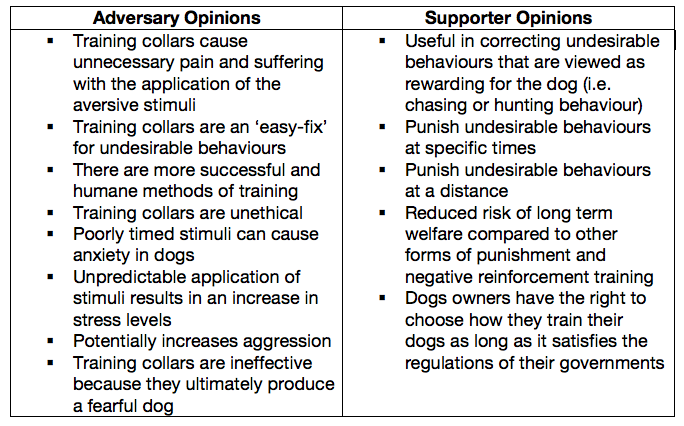Traditionally dog training focused on unpleasant and seemingly cruel techniques involving negative reinforcement and/or punishment. Today there is an increasing emphasis on positive reinforcement as a more humane method of canine training. There is considerable debate about the relative benefits of using different training approaches with respect to welfare implications (Blackwell et al. 2012). In addition, the use of training collars is a controversial issue (Polsky 1994).
Below is a chart made by Devon Edwards that outlines the opinions of individuals who are against the use of training collars vs. the opinions of individuals who support the use of training collars:
Position Statements from Reputable Organizations and Associations:
The Canadian Veterinary Medical Associaton
“The Canadian Veterinary Medical Association (CVMA) supports the use of humane training methods that are built on current scientific knowledge of learning theory. Methods using positive reinforcement are highly favoured. Methods causing fear, distress, pain or anxiety are unacceptable”
World Society for the Protection of Cruelty to Animals (WSPA) Canada
“Aversive training techniques are based on the principle of applying an unpleasant stimulus to inhibit behavior. This kind of training technique can include the use of prong collars, electric shock collars, restricting dogs’ air supply using nooses/leads or pinning them to the ground, which can cause pain and distress. The use of such techniques may compromise the welfare of dogs and may worsen the behavioral problems they aim to address, potentially placing owners at considerable risk. A number of scientific studies have found an association between the use of aversive training techniques and the occurrence of undesired behaviors in dogs.
WSPA believes that the use of such training techniques is not only unacceptable from a welfare perspective, but that this type of approach is not necessary for the modification of dog behavior. Dog trainers all over the world use reward-based methods to train dogs very effectively. Where dogs have behaviors which owners find unacceptable, such as aggression or destruction, qualified behaviorists achieve long term changes in behavior through the use of established and validated techniques of behavior modification without subjecting dogs to training techniques which may cause pain or distress.”
The Royal New Zealand Society for the Prevention of Cruelty to Animals
“The SPCA is opposed to the use of electric dog collars (both bark-activated and remote controlled) by the generic public. The SPCA is opposed to the use of citronella bark collars. Electric dog collars should only be used under the guidance of animal behaviour professionals, as the last resort. These collars can easily be misused by the general public looking for a quick solution to the problem, more often than not, related to a barren living environment with little or no social interaction. These are usually better ways of training a dog and/or modifying bad habits by analysing the underlying causes of the problem. The SPCA believes that citronella may be much harshier than originally thought, due to dog’s keen sense of smell. Until evidence is provided demonstrating that these collars are not severe, the SPCA does not condone their use.”





